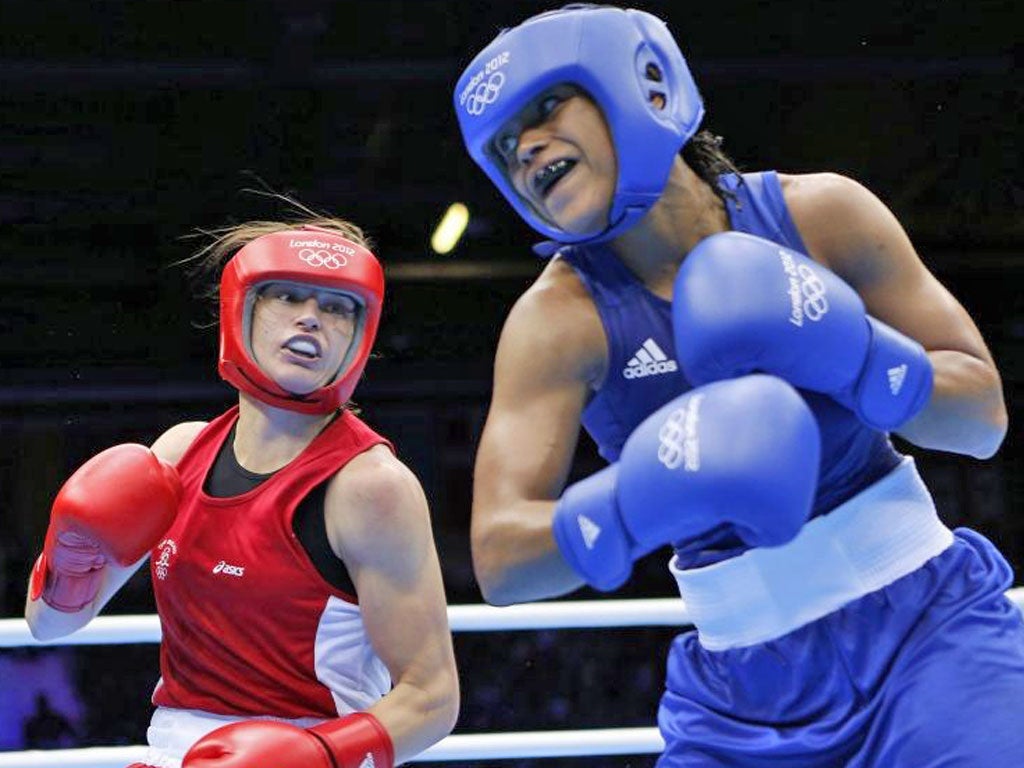Taylor delights green hordes after overwhelming Jonas
Ireland's star fighter is too strong for home hopeful as for once GB fans are outshouted

The ExCel boxing complex had a Dublin post code. Along the concourse outside the arena, RTE presenter Marty Morissey, the Des Lynam of Irish TV, had no shortage of volunteers for this vox pop. The idea of packaging atmosphere as frenzy at these Olympics is not new. And dear old Marty did not have to work his shtick too hard to get the story. In their tri-colour wigs and leprechaun hats the great Irish diaspora had him circled, each wanting to proclaim their Irishness louder than the next. This was Katie Taylor day, and her debut as an Olympian would not pass without affirmation and celebration.
The face of Irish Olympic endeavour and a four-time women's world lightweight champion, Taylor is as close to guaranteed gold as Ireland are going to get. Barry McGuigan, whose centrality to the narrative of Irish boxing is absolute, said so beforehand. A multi-decorated amateur, McGuigan considers his controversial loss in Moscow before the medal stage to be his greatest disappointment. Defeat was not an option for McGuigan but it came nonetheless. Taylor is the Clones Cyclone of her day, the standard bearer on whom all hopes rest.
She was in against Natasha Jonas, a British talent whose star is set only marginally lower than her own. Taylor's introduction did not require the panto presentation. Please make a noise for … the crowd got there first: Katie, Katie, Katie. Jonas must be the only British athlete at these Games to feel the Olympics are in another country. Taylor is from another world. A junior international in football and Gaelic football, she displays a preternatural instinct for sport.
The first round was close, Taylor edging it 5-2. The second was shared in the eyes of the judges. And then, as the greats seem to do, Taylor discovered another plane. Her range and timing acquired a sharper edge and Jonas was suddenly in a different ring. The Dublin quarter was in tumult and, as required in heightened circumstances such as these, broke out into a chorus of "The fields of Athenry".
In each of the closing two rounds Jonas was forced to take a standing count as Taylor emerged from a layer of circumspection. The bout as a contest was over. The margin of defeat was recorded at 26-15. "Judging on that performance she is unbeatable," Jonas said. "I'm not going to make any excuses. I came here the fittest, the leanest, the healthiest and smartest boxer I could be. She is still the best, coming out on top every time. I take my hat off to her. There is nothing else I could have done, maybe thrown the kitchen sink or drove the bus into her. I live to fight another day. Maybe in Rio in four years the result will be different."
The sense that something special, unique even, was taking place was shared by McGuigan. "She was class today. And against a world-class opponent. Katie is a brilliant representative for boxing, a great role model and a lovely human being. I cannot praise her highly enough. She is a true pioneer of women's sport."
McGuigan ventured that Taylor should not be discounted as a candidate for the Val Barker Trophy, the award given to the best boxer at these Games, should she fulfil her destiny and claim gold. "It is fantastic to be an Olympian at last. A dream come true. I have been waiting for this moment all my life. I have never experienced anything like it. Thank God for the victory today and to be in the semi-finals. It's a great privilege," Taylor said.
The improvement in women's boxing is marked, though the sport is not served well by the shoehorning of the weight divisions into three classifications. The audience, usually a male domain, had a heavy feminine accent and looking around the arena it is fair to claim that the Olympic denominations granted to the girls, flyweight (48-51 kilos), lightweight (57-60) and middleweight (69-75), was an insult to the diversity of the women watching, and those boxing. As Jonas pointedly observed "When you see women's boxing at the highest level like that how can you argue that women are not as good as the men. I hope we have done women's boxing proud today."
There were no dissenters at the ExCel. There were boos, however, but of the partisan kind expressing disappointment at the exit of British world champion Savannah Marshall in a ferocious middleweight contest against Marina Volnova of Kazakhstan. The decision could have gone either way but the scores consistently pointed to the blue corner and ended at 16-12 in favour of Volnova. There was better news at flyweight where Britain's Nicola Adams guaranteed herself a bronze with a dominant 16-7 win over Stoyka Petrova of Bulgaria.
Join our commenting forum
Join thought-provoking conversations, follow other Independent readers and see their replies
Comments
Bookmark popover
Removed from bookmarks